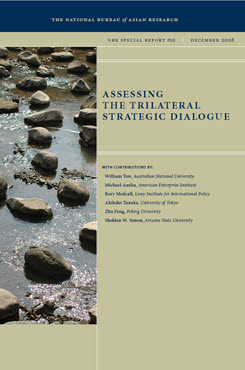The United States, Japan, and Australia
Security Linkages to Southeast Asia
This essay analyzes the similarities and differences in how Southeast Asian states and the U.S., Japan, and Australia prefer to enhance Southeast Asia’s security.
EXECUTIVE SUMMARY
This essay analyzes the similarities and differences in how Southeast Asian states and the U.S., Japan, and Australia prefer to enhance Southeast Asia’s security.
MAIN FINDINGS
- The U.S., Japan, and Australia have different, though compatible, strategic interests. With respect to Southeast Asia, their interests converge on freedom of the sealines of communication (SLOC), counterterrorism, and political stability.
- ASEAN states follow a hedging strategy toward external powers, inviting their economic and security participation while insuring that no one power dominates.
- Washington is increasingly emphasizing multilateral security activities to supplement bilateral relations in Southeast Asia.
- Southeast Asian states are somewhat suspicious of the Trilateral Strategic Dialogue, and wonder if it is being developed as an alternative to the ASEAN Regional Forum.
- Maritime nationalism has been an obstacle to external navy patrols and even to some naval cooperation among the states in the Strait of Malacca. Malaysia, Singapore, and Indonesia, however, have coordinated anti-piracy patrols in the Strait of Malacca and have sought technical assistance from Washington, Tokyo, and Canberra.
- With the exception of Singapore, ASEAN states oppose “securitizing” anti-piracy and anti-terrorism activities in the Strait of Malacca and the South China Sea. ASEAN members prefer to deal with the challenges as maritime crime and, therefore, as a law enforcement problem based on national jurisdictions.
POLICY IMPLICATIONS
- With respect to Southeast Asia, the trilateral countries should coordinate maritime safety and security assistance with the littoral states (Indonesia, Malaysia, and Singapore).
- Law enforcement agencies from the trilateral states should offer more technical assistance to Southeast Asian partners to enhance their capabilities to counter terrorism, drug and human trafficking, gun-running, and money laundering.
- The trilateral states should consider holding regular security discussions with their Southeast Asian partners to determine the kinds of assistance that Washington, Tokyo, and Canberra could provide.


